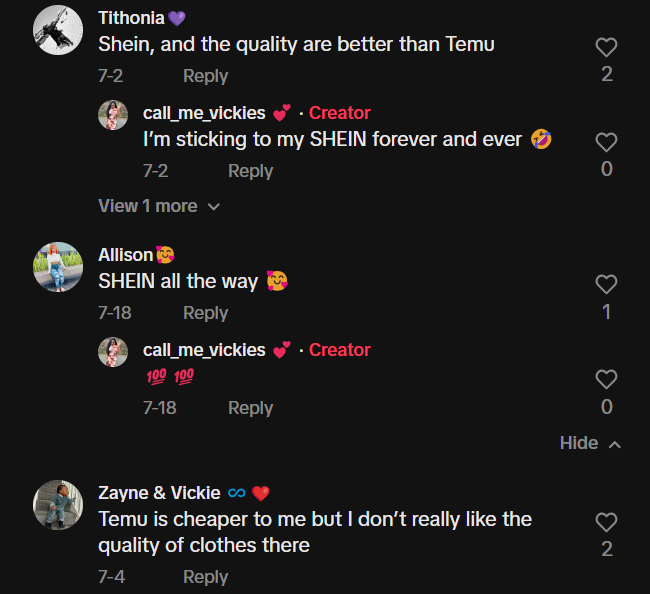Nike vs. Adidas, McDonalds vs. Burger King, and Apple vs. Microsoft. These are just a handful of the brands that have had notable feuds over the years. Now, two of the most famous fast fashion brands are entering the corporate world arena to duke it out. Retail giants Shein and Temu are locked in a fierce legal battle that’s making headlines and raising eyebrows across the industry.
At the heart of the dispute is a lawsuit filed by Shein against Temu, accusing the latter of copyright infringement, fraud, and building an empire on counterfeit goods. It’s a hypocritical move from Shein, considering the company itself is no stranger to similar allegations from other brands and independent artists. Pot, meet kettle.
What are the main accusations in the Shein vs. Temu lawsuit?
Shein’s complaint, filed in a Washington, D.C. federal court, paints a damning picture of Temu’s business practices. According to Shein, Temu is masquerading as a legitimate online marketplace while actively encouraging its sellers to steal designs from other brands. In other words, Shein is more or less calling Temu a wolf in sheep’s clothing. Even more concerning, Shein claims that Temu prevents these sellers from removing infringing products from the platform, even after they’ve admitted to breaching regulations.
Shein goes as far as to allege that Temu is losing money on every sale, subsidizing extremely low prices to lure in U.S. consumers. The complaint suggests that Temu basically banks on encouraging intellectual property infringement and the sale of counterfeit or substandard goods to minimize these massive losses.
In a bold claim, Shein accuses Temu of falsely pretending to be Shein on social media platforms like X (formerly Twitter) to redirect customers to the Temu platform. They even include a screenshot of a Temu-sponsored Google ad that shows Shein in the headline but Temu as the web address.
Shein also alleges that Temu has instructed its paid social media influencers to falsely claim that Temu products – often counterfeits of Shein items – are cheaper and of higher quality than genuine Shein goods. The complaint goes on to accuse Temu of poaching resources, employees, and suppliers from Shein in its efforts to imitate the company. To back up its claims, Shein’s 80-page complaint includes more than a dozen examples of clothes and designs that Temu allegedly copied. The company is asking the court to rule in its favor and prohibit Temu from using Shein’s confidential information.
What Temu has to say
Temu, as you would suspect, isn’t taking these accusations lying down. A spokesperson for the company fired back, calling Shein’s “audacity unbelievable” and accusing them of fabricating accusations against others for the very misconduct they’re repeatedly sued for.
This isn’t the first time these two retail titans have clashed in court. In fact, it’s just the latest chapter in an ongoing legal saga. Last year, Temu sued Shein over copyright concerns and allegations of using “mafia-style intimidation” to bully suppliers into exclusivity agreements.
The current lawsuit also accuses Temu of “brazen” illicit behavior, including the theft of valuable trade secrets by at least one Temu employee. This stolen information allegedly included details on Shein’s best-selling products and internal pricing information, which Temu then used to direct its sellers to copy and sell knock-off versions on its platform.

Congress is getting involved
Since the two online shopping outlets have become an insidious staple in the retail sector, the legal battle between these two e-commerce giants has caught the attention of U.S. lawmakers. Several members of Congress are drafting legislation aimed at reducing the trading advantages that Temu and Shein currently enjoy. This includes a trade rule known as de minimis, which allows the companies to ship packages without paying duty and certain taxes as long as shipments are under the value of $800.
As touched upon earlier, both companies have had their dirty laundry aired out and are facing separate accusations. Earlier this year, dozens of small business owners filed complaints against Temu, claiming their designs had appeared on the platform without consent. Shein, too, has faced similar accusations, with three independent designers suing the company last year for selling “exact copies” of their work.
Business is still booming
Despite their less-than-savoury business practices, Shein and Temu have taken the retail industry by storm with their ultra-low-priced products and ability to respond to trends far faster than their legacy competitors. However, this level of growth has come with its fair share of criticisms.
Both companies are among the fastest-growing in the country, sending nearly a million packages a day to American consumers and frequently topping the Apple App Store charts. In regard to their business model, which typically involves shipping packages directly from Chinese warehouses, it allows American consumers to buy fast fashion, electronics, and other products at incredibly low prices. However, this model has also raised concerns about labor practices and connections to the Chinese government.

What does the future hold?
As the legal battle continues, it’s clear that the stakes are high for both companies. With billions of dollars in revenue and a growing share of the U.S. market on the line, neither Shein nor Temu is likely to back down without a fight.
For now, American consumers continue to flock to these platforms, drawn by the allure of rock-bottom prices in a time of economic uncertainty and an endless variety of products. We’ve already witnessed the government cracking down on other Chinese-based corporations like TikTok, so it remains to be seen how this high-profile dispute will impact the future of ultra-fast fashion in the United States.











Published: Aug 22, 2024 06:05 am